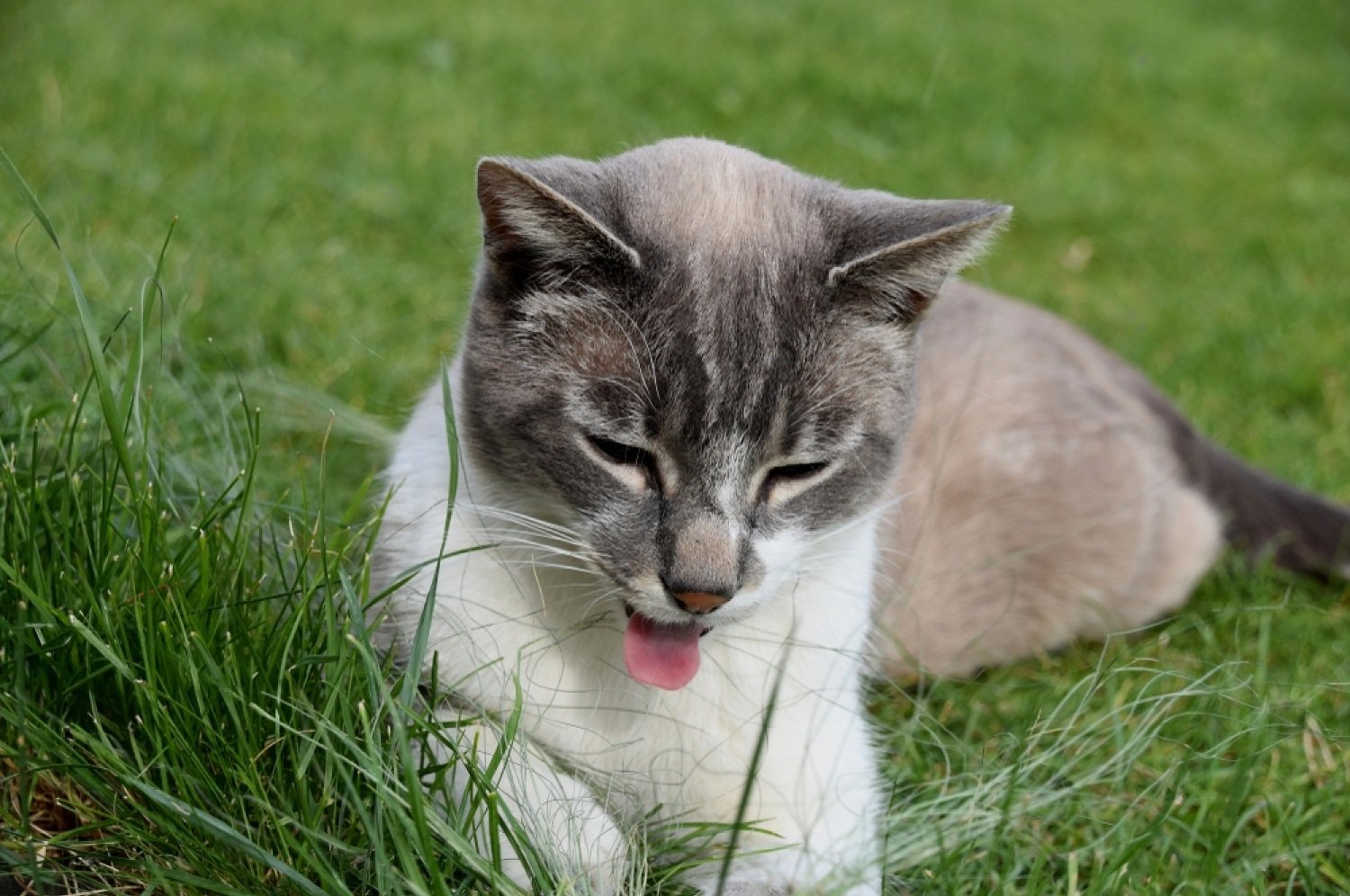Why Is My Cat Throwing Up Undigested Food
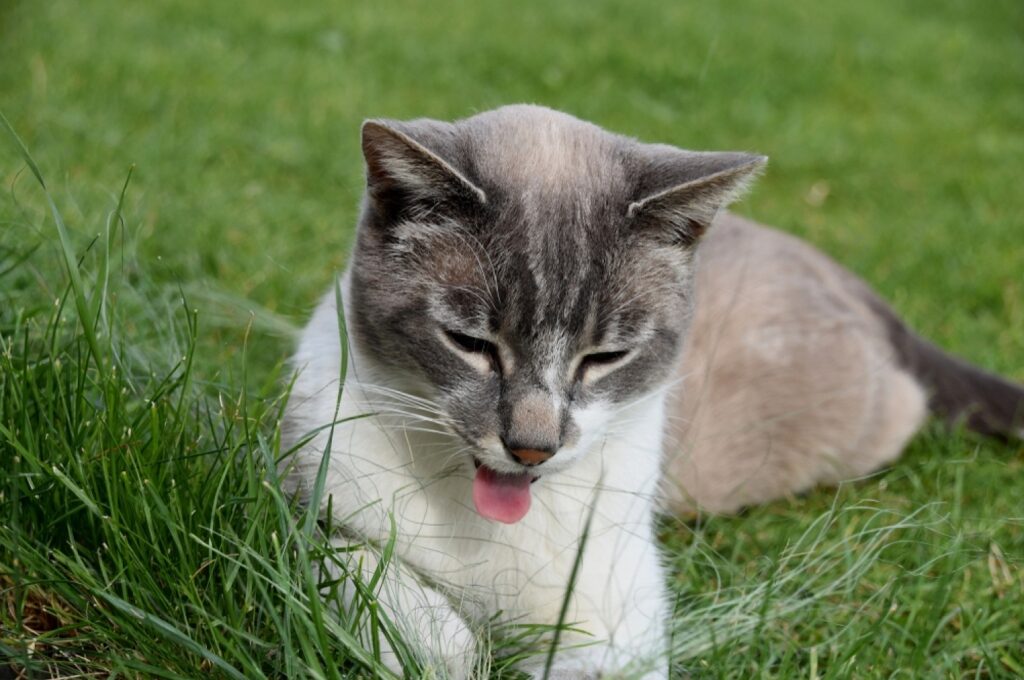
Vomiting is a common problem for cats, and it can be caused by a variety of medical conditions, including ingesting something toxic, having an infection, or having a digestive disorder. In some cases, your cat may vomit undigested food, which can be an indication of a more serious health issue. If your cat is vomiting undigested food, it is important to take them to the veterinarian as soon as possible in order to determine the cause of the vomiting and provide the necessary treatment.
Why Is My Cat Throwing Up Undigested Food
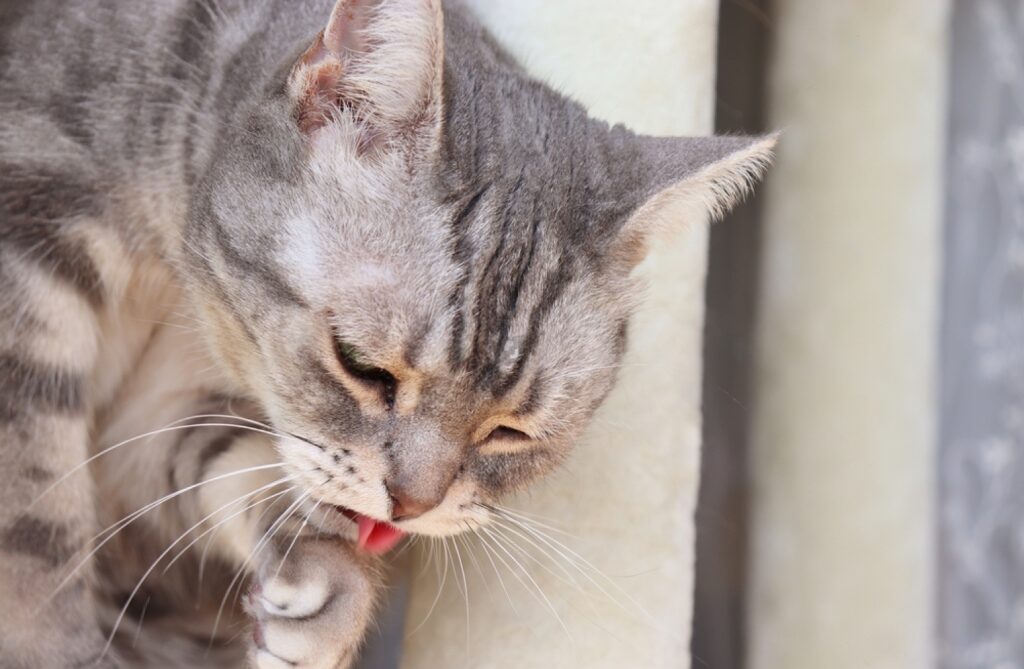
Vomiting is a common issue many cats face. Unfortunately, it can be tricky to pinpoint the exact cause. Cats can vomit for a variety of reasons, including dietary indiscretion, eating too fast, food allergies, infections, parasites, and more. One common cause of vomiting is eating too quickly, which can result in cats throwing up undigested food. This can happen because they eat too fast, the food is too large to be properly digested, or they may have eaten something that is not easily digested. If your cat is vomiting undigested food, it is important to have them examined early enough by a veterinarian to rule out any underlying medical conditions and prefer the necessary treatment.
The difference between your cat vomiting and regurgitating

Vomiting and regurgitation are two distinct processes that cause a cat to expel material from its digestive tract.
Vomiting is an active process, in which the stomach contracts and expels partially digested food. This is often followed by heaving, retching, and salivation. Vomiting may be caused by a variety of factors, including dietary indiscretion, gastrointestinal upset, foreign bodies, infections, metabolic disorders, and even anxiety or stress.
Regurgitation is a passive process that occurs when the cat expels partially digested food from the esophagus, usually without any warning signs. Regurgitation usually occurs shortly after eating and can be caused by a variety of factors, including esophageal disorders, foreign bodies, and certain metabolic and structural disorders.
In summary, vomiting is an active process, involving the stomach and is usually preceded by heaving and retching. Regurgitation is a passive process, involving the esophagus and is usually without warning signs.
Types of Vomiting

- Hairball Vomiting: Hairball vomiting is a common type of vomiting in cats. It occurs when cats groom excessively and swallow large amounts of hair, which can then accumulate in the stomach and intestines. Hairballs can cause the cat to vomit, often after eating, and may be accompanied by a coughing or gagging sound.
- Gastrointestinal Vomiting: Gastrointestinal vomiting is the most common type of vomiting in cats. It occurs when cats eat something that their bodies can’t digest or when something irritates the stomach, such as bacteria, a virus, or parasites. This type of vomiting can be accompanied by other symptoms such as diarrhea, abdominal pain, and loss of appetite.
- Motion Sickness: Motion sickness vomiting is caused by a cat’s sensitivity to motion, such as car rides or airplane trips. Cats can become nauseous and vomit when their bodies are subjected to movement, especially when they are not used to it.
- Food Sensitivities: Food sensitivities can cause cats to vomit after eating certain foods. Cats may be sensitive to specific ingredients or to certain types of food, such as dry food or canned food.
Common Reasons Why Your Cat Is Throwing Up Undigested Food

Eating too quickly: Cats may eat too quickly and then vomit shortly after because they ate too much in one sitting.
Hairballs: Cats groom themselves by licking their fur, ingesting some of the loose hair. This hair then accumulates in their stomachs, causing them to vomit it up.
Food intolerance: Cats may be intolerant to certain ingredients in their food, causing them to vomit it up.
Bacterial or viral infection: A bacterial or viral infection can cause cats to vomit undigested food.
Parasites: Intestinal parasites, such as worms, can cause cats to vomit undigested food.
Stress: Stress can also cause cats to vomit undigested food.
Eating too quickly
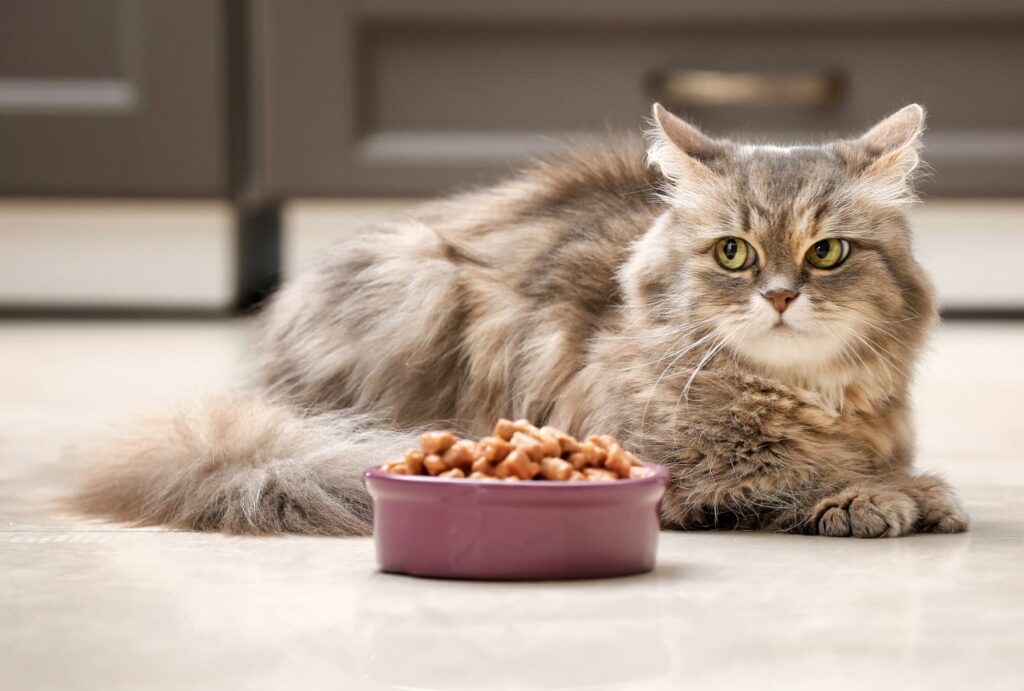
Eating too quickly can cause a cat to throw up undigested food because it rushes the process of digestion. When a cat eats too quickly, it doesn’t give its body enough time to properly break down the food, resulting in undigested chunks of food that can’t be properly absorbed.
To remedy this, the cat should be fed smaller meals more often throughout the day. This will give the cat more time to properly digest its food. Additionally, adding a slow-feed bowl to the cat’s mealtime routine can help to slow down the rate at which the cat eats, allowing it more time to digest its food. Finally, providing the cat with mental stimulation before and during mealtime can also help to slow down its eating. This can be accomplished by playing with the cat or giving it puzzle toys that it can interact with while eating.
Hairballs

Hairballs occur when a cat grooms itself excessively, swallowing hair and other debris. The hair accumulates in the cat’s stomach and forms a dense, hard mass. If the hairball is not expelled, it can cause a blockage in the cat’s digestive system. This blockage can cause vomiting, loss of appetite, and in severe cases, intestinal obstruction.
Remedies for hairballs include brushing your cat regularly to remove excess hair, feeding your cat a high-fiber diet to help move hair through the digestive system, and using hairball remedies such as petroleum jelly or cat treats designed to help prevent and expel hairballs. Additionally, utilizing a probiotic supplement to help improve the cat’s digestion can help reduce the likelihood of hairballs forming.
Food intolerance

Food intolerance is when a cat’s digestive system cannot properly digest certain ingredients in the food they are eating. This can occur in cats of any age and can be caused by a variety of factors such as an intolerance to a specific food or ingredient, a poor diet, or an underlying health condition.
When a cat has a food intolerance, it may experience a variety of digestive issues such as vomiting, diarrhea, gas, bloating, and abdominal pain. One of the most common symptoms of food intolerance in cats is throwing up undigested food. This occurs when the cat’s digestive system is unable to properly break down the food, resulting in the food being expelled back up.
The best way to remedy a food intolerance in cats is to identify the source of the intolerance and eliminate it from their diet. If the problem is caused by a poor diet, then switching to high-quality, grain-free cat food can help to reduce the symptoms. If the intolerance is caused by a specific ingredient, then it’s important to identify which ingredient is causing the reaction and eliminate it from their diet. Additionally, some cats may benefit from supplements such as probiotics or digestive enzymes to help improve digestion. If the intolerance is caused by an underlying health condition, then it’s important to work with a veterinarian to identify and treat the condition.
Bacterial or viral infection

Bacterial and viral infections are the most common causes of vomiting in cats. Bacterial infections can be caused by ingestion of contaminated food or water, contact with infected surfaces, or contact with another animal that is carrying the bacteria. Symptoms of bacterial infection can include vomiting, diarrhea, and fever.
Viral infections are caused by a virus that invades the cat’s body and can cause vomiting, loss of appetite, fever, and dehydration. Symptoms may include vomiting, loss of appetite, fever, and dehydration.
In either case, when a cat vomits undigested food, it is a sign that the cat is not able to digest the food properly. This can be a sign of an underlying health issue and should be addressed as soon as possible.
The remedy for bacterial or viral infection-induced vomiting in cats is to take the cat to the vet for a proper diagnosis and treatment plan. Treatment may include antibiotics, antiviral medications, or other medications to help control the symptoms and reduce the risk of further infection. In some cases, the vet may recommend changes to the cat’s diet, such as avoiding certain foods or adding supplements. It is important to follow the vet’s advice to ensure that the cat is able to properly digest its food and maintain its health.
Parasites

Parasites such as worms, mites, and protozoa can cause a cat to throw up undigested food. These parasites live in the cat’s intestines and feed on the food the cat eats. As they feed, they produce toxins that irritate the lining of the intestine, causing inflammation and a weakened digestive system. This can lead to vomiting of undigested food.
The remedy for this is to treat the cat for parasites with appropriate anti-parasitic medication. This will kill the parasites and reduce the irritation and inflammation in the intestines. It is important to follow the directions of the medication, as different parasites require different treatments.
In addition to medication, it is important to feed the cat a healthy diet. This will help to strengthen the digestive system and reduce the likelihood of parasites. It is also important to keep the litter box clean and provide plenty of fresh water for the cat to drink.
Finally, it is important to take the cat to the veterinarian for regular checkups and to make sure that the parasites have been eradicated.
Stress

Stress can cause a cat to vomit undigested food for various reasons. Stress can lead to an imbalance of the hormones cortisol and epinephrine, which can lead to digestive issues. A cat may also experience an increase in stomach acid, which can cause vomiting. Stress can also lead to a decrease in digestive enzymes, which can cause food to be inadequately digested and expelled from the stomach as vomit.
To remedy this, it is important to reduce the amount of stress in the cat’s life. It is important to try to identify the source of the stress and address it. If the source of the stress is not known, then it is important to make sure the cat’s environment is as stress-free as possible. This can include providing a calm and peaceful environment with plenty of places to hide and relax. Additionally, owners can provide their cats with toys and activities that will help them to stay occupied and reduce stress. Regular play sessions and interactive toys can help to reduce stress and keep the cat entertained.
At-home Remedies
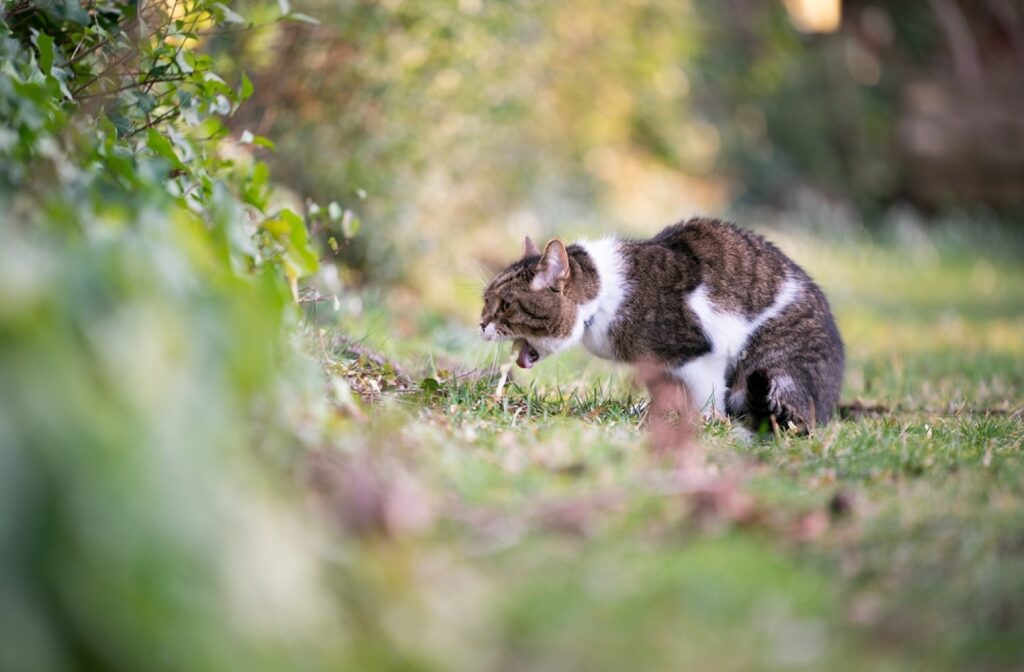
- Feed smaller meals. Feeding your cat smaller meals throughout the day may help to reduce the amount they vomit.
- Try a different food. If your cat is throwing up undigested food, it could be a sign they are sensitive or allergic to the food they are eating. Try switching to a different brand or type of food.
- Avoid table scraps. Table scraps can be hard for cats to digest, so it’s best to avoid giving them to your cat.
- Provide fresh water. Make sure your cat always has access to fresh, clean water.
- Monitor feeding. Make sure your cat isn’t overeating or eating too quickly.
- Increase fiber. Adding more fiber to your cat’s diet can help with digestion. Try adding a small amount of canned pumpkin to their food.
FAQ
Q. Why is my cat throwing up undigested food and diarrhea
A. Your cat may be experiencing a medical problem such as an intestinal infection, intestinal parasites, or food allergies.
Q. Why is my cat throwing up undigested food hours after eating?
A. There are several possible causes for a cat throwing up undigested food hours after eating. It could be due to a dietary issue, such as food intolerance, or it could be due to a medical issue, such as an infection or a digestive disorder.
Q. Why is my cat throwing up undigested dry food?
A. There can be a few reasons why your cat is throwing up undigested dry food. It could be due to food sensitivity or intolerance, a digestive issue, or even stress or anxiety.
Q. Why is my cat throwing up undigested food but acting normal?
A. It is possible your cat is suffering from a mild form of gastroenteritis, which can cause vomiting or diarrhea. Another possibility is that your cat has eaten something that has upset its stomach and is now trying to expel it.
Conclusion
In conclusion, cats may vomit undigested food due to a variety of reasons. These include overeating, eating too quickly, eating spoiled food, gastrointestinal infections, or a reaction to certain medications.

